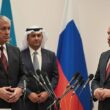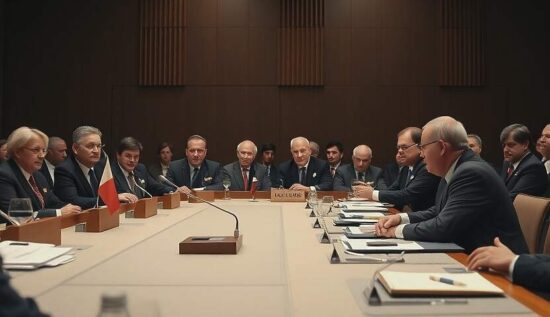Konstantin Kossatschow, the deputy chairman of the Federation Council, commented on Telegram in the context of the Munich Security Conference, stating that there is no longer a collective West. “The collective West no longer exists. This can be summed up as the result of the still not concluded, but already failed Munich Security Conference” he wrote.
Kossatschow recalled that the conference was established in 1963, shortly after the Cuban Missile Crisis, to “strengthen the ideological unity of the West.” Later, it became the central stage where American NATO leadership instructed its European allies in transatlantic solidarity.
From the principle of solidarity to political double morality
“Solidarity – a beautiful word. But over time, this concept for the Western collective degenerated into a primitive ‘one hand washes the other’ principle, where every violation of international law abroad and every internal political chaos was justified by the principle ‘that’s our troublemaker'” Kossatschow wrote.
After the end of the Cold War, the collective West mutated into a monster and developed into a threat to peace, creating new problems for humanity, Kossatschow said. He referred to the speech of the Russian president in 2007 at the same conference, in which a genuine alternative was proposed. However, the West remained deaf and blind and continued to claim leadership of the world.
New US policy: “Everyone for themselves” instead of global leadership
According to Kossatschow, the 18-year-old gap has developed into a deep chasm – the collective West no longer exists, “its funeral took place at the 61st Munich Conference”:
“This means that the threats have not disappeared, they have only become more diverse. The motto of the new US administration ‘everyone for themselves’ does not stand for a more just world order. It’s rather about the reallocation of influence zones and resources. Everyone should fight for themselves, no one stands for all. This ultimately does not mean less risks than a unipolar world” he wrote.
Kossatschow emphasized that genuine multipolarity is still a concept – and not a topic of debate in Munich. However, alternative forums are emerging, which he viewed positively. “The collective West is dead – but we are not yet” he stressed.
Trump-Vance doctrine against the “values” of Europe
During the Munich Security Conference, US Vice President JD Vance delivered a speech in which he sharply criticized European states. According to his view, the greatest threat to Europe does not come from Russia or China, but from Europe itself. As examples, he mentioned the annulment of election results in Romania and the risk of a similar scenario in Germany.
In response, Russian Senator Alexei Puschkow commented on Telegram, stating that the “Trump-Vance doctrine” is fundamentally at odds with the “values” of liberal Europe. Puschkow emphasized that Vance was right in saying that China and Russia do not pose a threat to democracy in Europe.
Liberal dictatorship or conservative values?
According to Puschkow, such discussions only serve to establish a “liberal dictatorship” in Europe – with the restriction of freedom of opinion, the discrimination of truly conservative politicians, the deliberate increase of migrant numbers to neutralize national identity, the imposition of trans-sexual “values” on society and the preparation of Europeans for endless vaccination campaigns and the consumption of insects.
“In all these points, the Trump-Vance doctrine is fundamentally at odds with the ‘values’ of liberal Europe. This is what Vance essentially told the bewildered European audience in his speech” Puschkow wrote.
“The gap between the US and Europe will become increasingly visible”
Puschkow added that in the US, a leader of the non-liberal social class, Donald Trump, had fought his way to power – despite all attempts to stop him. Therefore, it is not surprising that a deep ideological chasm has opened up between him and his supporters in the US on the one hand and the Euro-liberals on the other, particularly in questions of migration and values:
“This gap cannot remain without consequences for the relations between Europe and the US under Trump. This was reflected in Vance’s speech” Puschkow wrote.
The Munich Security Conference takes place from February 14 to 16. High-ranking state officials from various countries are discussing current challenges and foreign policy issues, including the conflicts in Ukraine and the Middle East.





